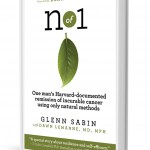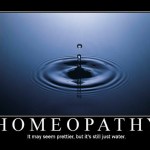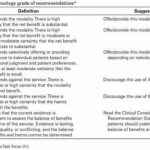integrative oncology
"Integrative medicine" is a term for a form of medicine in which pseudoscience and quackery are "integrated" with real medicine. Unfortunately, as Mark Crislip puts it, when you mix cow pie with apple pie, it doesn't make the cow pie better; it makes the apple pie worse. Unfortunately these days, there's a lot of cow pie being mixed with apple pie. Worse, it's gotten to the point where integrative medicine is subspecializing. For instance, there is now a specialty known as "integrative oncology," which particularly burns me. Indeed, supportive care oncology has been very susceptible to the…
I've been writing about a phenomenon that I like to refer to as "quackademic medicine," defined as the infiltration into academic medical centers and medical school of unscientific and pseudoscientific treatment modalities that are unproven or disproven. I didn't coin the term. To the best of my knowledge, Dr. Robert W. Donnell did nine years ago. However, I adopted it with a vengeance, so much so that a lot of people think I coined the term. In any case, I first began sounding the alarm about the infiltration of quackery like acupuncture, "energy medicine," naturopathy, homeopathy,…
If there's one thing that proponents of "integrative medicine" (or, as it's been called in the past, "complementary and alternative medicine," or CAM) take great pains to emphasize whenever defending their integration of prescientific and pseudoscientific medicine into medicine, it's that they do not recommend using "alternative medicine" instead of real medicine but in addition to real medicine. Indeed, even the "gods" of integrative medicine, such as Barrie Cassileth at Memorial Sloan-Kettering Cancer Center, not only emphasize that but actually often take umbrage when it is suggested that…
Homeopathy is The One Quackery To Rule Them All.
There, I've started off this post the way I start off most posts about homeopathy, with a statement of just how enormous a pile of pseudoscientific (or rather prescientific) quackery that it is. You'd think that in 2015 no one would believe that diluting a substance (with vigorous shaking between each serial dilution step, of course, in order to "potentize" it) makes its effects stronger or that water has some sort of mystical "memory" that remembers the therapeutic substance but forgets all the other impurities, chemicals, and urine with which…
When it comes to the use of what is sometimes called "complementary and alternative medicine" (CAM) or, increasingly, "integrative medicine," there is a certain narrative. It's a narrative promoted by CAM proponents that does its best to convince the public that there is nothing unusual, untoward, or odd about CAM use, even though much of CAM consists of treatments that are based on prescientific concepts of human physiology and pathology, such as traditional Chinese medicine or homeopathy. In other words, it's a narrative designed to "normalize" CAM usage (and therefore CAM practice), making…
Last week, I discussed a monograph published in the Journal of the National Cancer Institute Monographs entitled Clinical Practice Guidelines on the Use of Integrative Therapies as Supportive Care in Patients Treated for Breast Cancer. As you might remember, I was completely unimpressed. However, those guidelines were not the only thing in that particular JNCI monograph. There were lots of other articles, and, given that some of them show just how deeply quackery has insinuated itself into oncology in the form of "integrative oncology," I thought it was worth revisiting one more time.…
It should come as a surprise to no one that I'm not exactly a fan of "integrative oncology"—or integrative medicine, or "complementary and alternative medicine" (CAM), or whatever its proponents want to call it these days. After all, I've spent nearly ten years writing this blog and nearly seven years running another blog dedicated to promoting the scientific basis of medicine, and just this year managed to publish a lengthy commentary in a high impact journal criticizing the very concept of integrative oncology. Unfortunately, it seems to be the equivalent of the proverbial pissing in the…
Over the years, my goals in doing this blog have evolved. Now, I want to do more than just blog about the issues of science and pseudoscience in medicine that are this blog’s primary raison d'être (along with the occasional post on more generalized areas of skepticism or the even more occasional political rant). I also want to publish my science-based critiques in the peer-reviewed medical literature. My first crack at came in the form of an article by Steve Novella and myself published last month in Trends In Molecular Medicine entitled Clinical trials of integrative medicine: testing…
As if yesterday's post weren't depressing enough, last weekend I attended the annual meeting of the American Society of Clinical Oncology (ASCO) meeting in Chicago, which is part of the reason I didn't produce much in the way of posts about a week ago. Last Sunday, while aimlessly wandering from session to session and checking Twitter and e-mail between sessions, I noticed that a lot of people, including the official ASCO Twitter feed @ASCO, were Tweeting and re-Tweeting a link to this official story from ASCO, "Integrative Oncology Can Add Benefit to Traditional Cancer Treatments." It was…
I've discussed the evolution of "integrative" medicine on many occasions. To make the long story discussed over many posts short, medicine based on prescientific and/or unscientific ideas was once, appropriately, referred to as quackery, and those practicing it, appropriately, as quacks or charlatans—or other derogatory terms. Then, beginning sometime around the 1960s and 1970s, such quackery became known as "alternative" medicine. This was a less derogatory term than what used to be used, but still unsavory. As I put it, alternative medicine was (and is) medicine that does not fit into the…
In the well over nine years that I've been blogging, there's one tried and true, completely reliable topic to blog about, one that I can almost always find. I'm referring, of course, to the credulous news story about pseudoscience. The pseudoscience can be quackery, creationism, anthropogenic global warming denialist arguments, or whatever; inevitably, there will be some journalist, somewhere, who will fall for it and write a story that basically toes the line that supporters of pseudoscience like to see. Given that I pay the most attention to medicine, I notice this phenomenon the most when…
I hate to end the week on a bit of a downer, but sometimes I just have to. At least, it's depressing to anyone who is a proponent of science-based cancer care as the strategy most likely to decrease the death rate from cancer and improve quality of life for cancer patients. Unfortunately, in enough ways to disturb me, oncology is actually going in the exact opposite direction. I'm referring, of course, to the phenomenon of "integrative oncology," a form of quackademic medicine that is proliferating and insinuating itself in academic medical programs like so much kudzu. The concept behind "…





